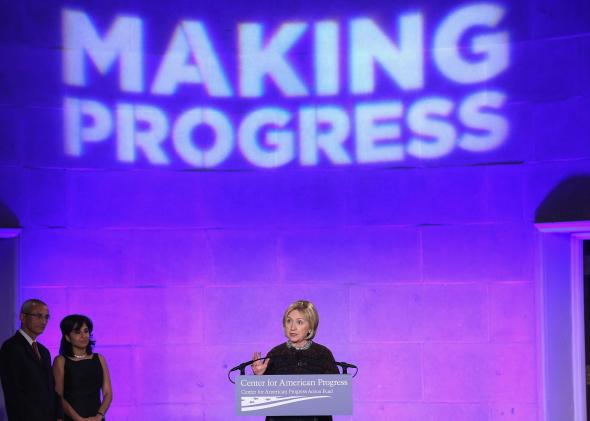How Your Media Turns Everything into a “Gaffe,” in One Lesson

Photo by Chip Somodevilla/Getty Images
Yesterday afternoon I crammed into the reporter rows of the annual #MakeProgress conference, the Center for American Progress's busy one-day training session for millennials. After a boxed lunch, Vice President Biden received an award and gave a 43-minute stemwinder that skipped and zoomed from his emotions after the 1972 death of his wife to the necessity of social welfare to the greatness of the military to how much America had changed. The rhetorical climax of the speech came when Biden remembered walking across Caesar Rodney Square, in Wilmington, to leave a private law firm for a lower-paying public-sector job.
"Almost 40 years to the day," he said, "I was standing in this exact same spot, being taken right to Washington to be sworn in as the vice president for the first African-American president in the history of the United States of America." That set up his advice to a bunch of twentysomethings. "Everybody says because we tried in '08 and it didn't happen, it's not possible. Wrong. We've gone through these periods before ... folks, this is totally within our power. Change, change for the better, is absolutely possible. And I believe it's close to inevitable if you're the drivers of it."
The point, sort of hard to find a lede for, was that activists had forced change that politicians did not see coming. It's almost a common theme in Democratic speeches. This election isn't about me! You have the power! Etc. Nearly two years ago, Barack Obama went for a flourish in a Univision interview and acknowledged that his "hope and change" campaign had not in itself changed Washington. "The most important lesson I've learned is you can't change Washington from the inside," he said. "You can only change it from the outside." At that time, a few pundits and reporters wondered if Obama had gaffed. It seems pretty clear now that he hadn't.
But it's at least clear that nobody remembers it. The punditocracy has the collective memory of a newborn fruit fly. Biden's "change" line was clipped by the RNC, and by conservative media like the Washington Free Beacon and Townhall. "Change Obama Promised in 2008 'Didn't Happen.' " read the WFB headline. The partisan focus turned Biden's quote into a "gaffe," which led to its discussion on a surreal CNN panel featuring National Journal's Ron Fournier and the AP's Julie Pace:
King: You can read that, Ron Fournier, as persistence, we'll keep trying or you can read it, yeah, well, all right, we failed.
Fournier: There must be a clip after that where he says, hey, I’m just kidding. He—he basically conceded the original sin of the Obama presidency, which is, we promised to at least start changing Washington and we failed, and then later on what he does say there is we can change things if we're the drivers of the change. Well, who’s been driving the last five and a half years? It was a really bad moment for the White House.
King: You think a really bad moment. You cover the White House every day, they say this is the appeal of Joe Biden, he calls them like he sees it, he’s a straight shooter. They can't like that.
Pace: They like it when he's straight shooter saying things that help; they certainly don't like it when he's a straight shooter and saying that essentially the White House has failed in changing Washington. This is why it would be so difficult for Joe Biden to run for president because he would be running for president as an active part of this administration.
This exchange was silly enough on its own, but consider: Just two days ago, Fournier used his column to tut-tut the way Obama and his team try to make every story about the White House. "Obama would argue that he's fighting for Americans and is blocked by a stubbornly conservative House," wrote Fournier. "It's a point worthy of debate, but it's argued poorly, because Obama leans on three words that should be virtually banned from the vocabulary of any leader: I, me, and my."
So on Tuesday, the White House's problem is that it told a story in which Obama—that egoist!—was the only actor in our political drama. On Thursday, Joe Biden has gaffed by saying that activists have to drive change because it's not all up to the president. This is like some lost Escher sketch of incoherence and lazy punditry.
